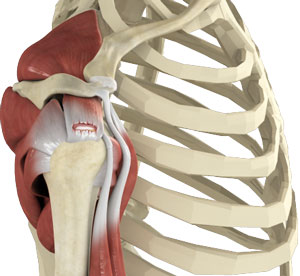Rotator Cuff Tear

Rotator cuff is the group of tendons in the shoulder joint providing support and enabling wider range of motion. Major injury to these tendons may result in tear of these tendons and the condition is called as rotator cuff tear. It is one of the most common causes of shoulder pain in middle aged adults and older individuals.
Causes
Rotator cuff tear results from pressure on the rotator cuff from part of the shoulder blade (scapula) as the arm is lifted. It may occur with repeated use of arm for overhead activities, while playing sports or during motor accidents.
Symptoms
Rotator cuff tear causes severe pain, weakness of the arm, and crackling sensation on moving shoulder in certain positions. There may be stiffness, swelling, loss of movements, and tenderness in the front of the shoulder.
Diagnosis
Your surgeon diagnoses Rotator Cuff Tear based on the physical examination, X-rays, and imaging studies, such as MRI. Rotator cuff tear is best viewed on magnetic resonance imaging.
Conservative Treatment Options
- Rest
- Shoulder sling
- Pain medication Injection of a steroid (cortisone) and a Local anesthetic in the subacromial space of the affected shoulder to help decrease the inflammation and pain
- Certain Exercises
Surgery
Rotator cuff repair may be performed by open surgery or arthroscopic procedure. In arthroscopy procedure space for rotator cuff tendons will be increased and the cuff tear is repaired using suture anchors. These anchor sutures help in attaching the tendons to the shoulder bone. Following the surgery, you may be advised to practice motion and strengthening exercises.
















